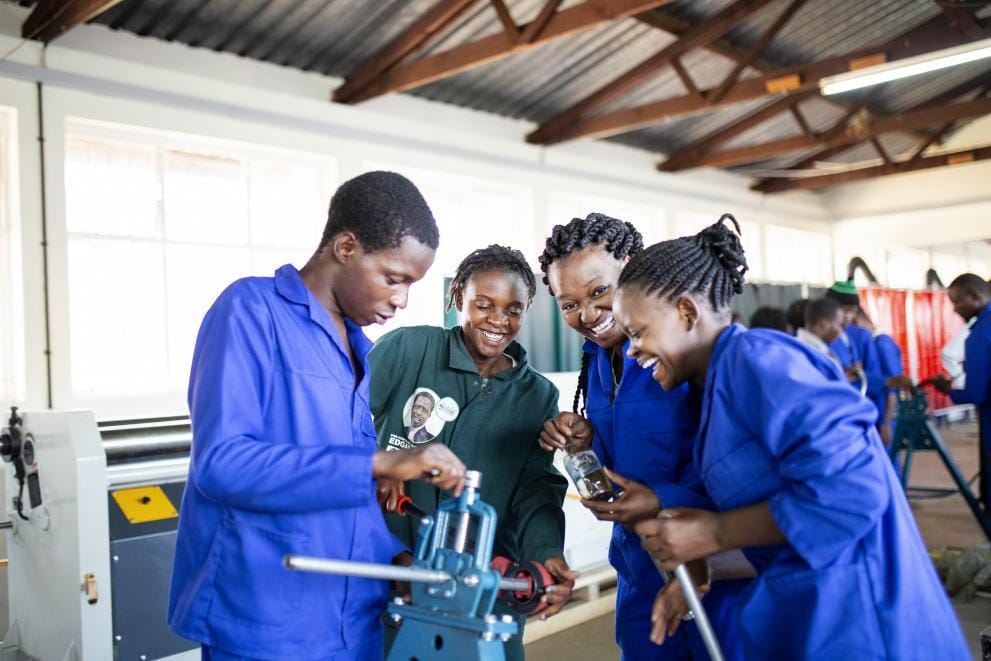In Summary
- Mauritius leads Africa in vocational education, with 54.09% of its population possessing technical or vocational skills, backed by a comprehensive certification framework.
- Over 40% of the population in Mauritania, Zimbabwe, and Ghana are engaged in formal or informal vocational programs through national policies and reforms.
- Most top-performing countries have centralized qualification frameworks and have recently undergone reforms aimed at improving TVET access, standardization, and labor-market alignment.
Africa’s vocational education revolution is no longer a vision—it’s happening now. As the continent focuses on employability, self-reliance, and practical skill-building, vocational and technical education has become a national priority in several countries. It is rising fast and empowering millions with practical skills that lead directly to employment.
In 2025, more African countries are expanding access to vocational training as a key solution to youth unemployment and skill shortages. Countries like Mauritius, Egypt, and Zimbabwe have structured national frameworks, industry-relevant curricula, and government-supported reforms fueling their growth. This list ranks the top 10 African countries with the best vocational education systems in 2025, using verified data and facts to measure their progress and effectiveness.
10. Zambia
Zambia is steadily building a strong vocational education base, with institutions such as Evelyn Hone College under the supervision of the Technical Education, Vocational and Entrepreneurship Training Authority (TEVETA). In 2025, vocational training participation in the country stands at 37.50%, a result of recent government reforms that merged multiple ministries into a unified Ministry of Education. This restructuring has improved policy direction and expanded access to TVET programs, particularly in areas like construction, agriculture, and mechanical engineering.
9. South Africa
South Africa operates one of the most organized vocational education systems on the continent. Managed by the Department of Higher Education and Training, its network of TVET colleges is aligned with 21 Sector Education and Training Authorities (SETAs). In 2025, 38.20% of the population will possess vocational or technical skills, thanks to an active qualifications framework and sector-specific programs tailored to local industry needs, including tourism, manufacturing, and technology.
8. Namibia
Namibia has embraced competency-based training and industry collaboration, resulting in a highly functional vocational training landscape. With institutions like the Polytechnic of Namibia leading the charge, the country’s 2024 curriculum overhaul focused on employability and quality standards. As of 2025, 38.74% of Namibians report holding vocational or technical training, especially in fields like hospitality, auto mechanics, and renewable energy.
7. Kenya
Kenya’s TVET Authority has registered and accredited more than 2,000 institutions across the country. These range from community-level polytechnics to advanced national technical colleges. In 2025, 38.84% of the population has vocational skills, bolstered by public-private partnerships such as the ICT Fire and Rescue initiative. Kenya’s recognition of informal training through Recognition of Prior Learning (RPL) further strengthens its vocational reach.
6. Benin
Benin has made major strides by reforming its Ministry of Secondary, Technical, and Vocational Education and launching a new National TVET Qualifications Framework. The framework helps standardize training across eight provinces and encourages certification in fields like textile production, construction, and electronics. With these initiatives in place, 39.08% of Benin’s population now has vocational or technical training.
5. Ghana
Ghana’s dual vocational system blends formal training with informal apprenticeship models, making it one of the most inclusive in Africa. The Council for Technical and Vocational Education and Training (COTVET) is leading efforts to unify curricula and boost instructor quality. In 2025, 39.34% of Ghanaians possess technical or vocational training, with many specializing in construction, electrical work, and artisanal trades.
4. Zimbabwe
Zimbabwe’s vocational strategy is powered by its Education Sector Strategic Plan (2021–2025) and includes support from international partners like UNESCO and UNICEF. Digital skills hubs, expanded polytechnics, and a focus on practical trades have contributed to growing success. The 2025 figures show 39.45% of Zimbabwe’s population reporting vocational training—thanks to the government’s push for accessible, digital-friendly skill centers across the country.
3. Mauritania
Mauritania’s vocational network includes 44 secondary institutions and a growing number of post-secondary training centers. Reforms have modernized vocational programs and boosted both accreditation and enrollment. As a result, 40.20% of the population in 2025 now has formal vocational or technical training, with key programs in fisheries, mining, and environmental management.
2. Egypt
Egypt’s vocational system is deeply embedded into its education structure. With technical streams available in secondary schools and a wide array of post-secondary institutes, Egypt has created robust vocational pathways. In 2025, 52.35% of its population hold vocational qualifications. National education policy and Egypt’s Vision 2030 plan have fueled major investments in technical education, particularly in manufacturing, healthcare, and technology sectors.
1. Mauritius
Mauritius stands as the top African country for vocational education in 2025, with 54.09% of its population reporting technical or vocational skills. This success stems from its well-organized framework managed by the Mauritius Qualifications Authority (MQA), which includes clear pathways through pre-vocational certificates and National Trade Certificates. The system emphasizes lifelong learning, with progression routes that connect vocational education to higher learning and industry needs—making Mauritius a true leader in skills development on the continent.

